Justice Breyer: Laws Against Koran Burning May Not Be Unconstitutional
In comments this morning, Justice Stephen Breyer seemed to suggest that Koran burning might not necessarily be Constitutionally protected.
Some rather odd comments this morning from Supreme Court Justice Stephen Breyer suggesting that he doubted whether burning a Koran would be considered Constitutionally protected speech:
Last week we saw a Florida Pastor – with 30 members in his church – threaten to burn Korans which lead to riots and killings in Afghanistan. We also saw Democrats and Republicans alike assume that Pastor Jones had a Constitutional right to burn those Korans. But Supreme Court Justice Stephen Breyer told me on “GMA” that he’s not prepared to conclude that — in the internet age — the First Amendment condones Koran burning.
“Holmes said it doesn’t mean you can shout ‘fire’ in a crowded theater,” Breyer told me. “Well, what is it? Why? Because people will be trampled to death. And what is the crowded theater today? What is the being trampled to death?”
Last week President Obama told me that Pastor Jones could be cited for public burning – but that was “the extent of the laws that we have available to us.” Rep. John Boehner said on “GMA” that “just because you have a right to do something in America does not mean it is the right thing to do.”
For Breyer, that right is not a foregone conclusion.
“It will be answered over time in a series of cases which force people to think carefully. That’s the virtue of cases,” Breyer told me. “And not just cases. Cases produce briefs, briefs produce thought. Arguments are made. The judges sit back and think. And most importantly, when they decide, they have to write an opinion, and that opinion has to be based on reason. It isn’t a fake.”
Now, partly, Breyer’s response is a reflection of the fact that no sitting Justice is going to be willing to discuss the specifics or the law behind an issue that may make it’s way before him at some point in the future.
Since I’m not a member of the Supreme Court, however, and I’m pretty sure I never will be, let’s take a look at this issue…
The “fire in a crowded theater” line that Breyer quotes, and which most Americans are familiar with even if they’re not familiar with the background of the phrase, comes from Schenck v. United States where the Supreme Court upheld the prosecution of a member of the Socialist Party for printing and distributing anti-war, anti-draft pamphlets during World War One. In that case, the Court set out the “clear and present danger” test:
“The question in every case is whether the words used are used in such circumstances and are of such a nature as to create a clear and present danger that they will bring about the substantive evils that Congress has a right to prevent.”
The went on to find that Schneck’s advocacy of resistance to President Wilson’s war policy and the draft constituted sufficient “clear and present danger” to justify jailing him for six months. It’s actually a fairly shocking outcome in our world; the idea that someone can be jailed for speaking out against a war they disagree with would outrage most Americans today. In World War One America, though, the Supreme Court said it was Constitutional and, under the Schenck standard, it’s quite possible that someone burning a Koran could be jailed under an applicable law.
Fortunately, though, the Supreme Court has modified it’s holding in Schenck over the years and, most recently held in Brandenburg v. Ohio that speech can only be restricted if “such advocacy is directed to inciting or producing imminent lawless action and is likely to incite or produce such action.” Under this standard, it’s hard to see how, say, Pastor Jones’s canceled Koran burning last week could have been barred as “incitement” of any kind. It may be offensive, but it is Constitutionally protected.
Finally, as Jonathan Adler notes at The Volokh Conspiracy, we’ve already got a case out there that says that flag burning is Constitutionally protected speech. It’s hard to believe that the ruling in Texas v. Johnson would not be equally applicable to burning the Koran or any other “holy” book.
Update: I’ve changed the post title. As was pointed out to me on Twitter, framing this as a discussion of the “constitutionality” of Koran burning is nonsensical. One lawyer demerit for me.
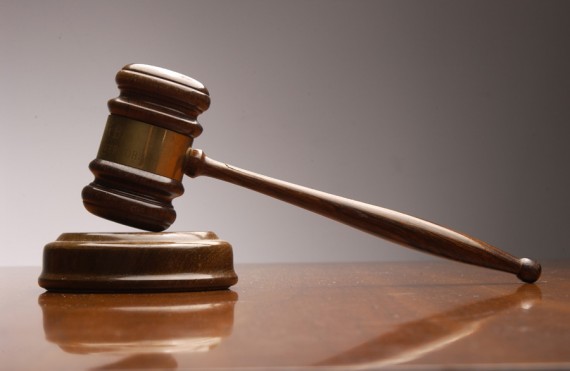


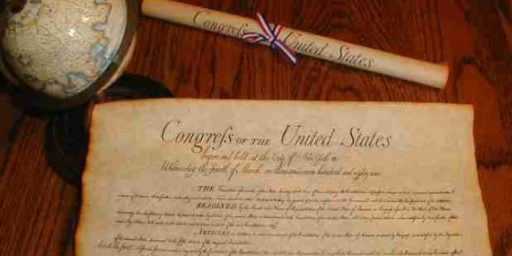
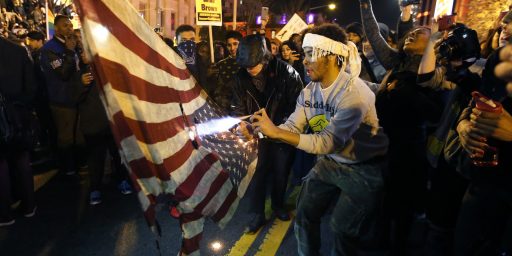
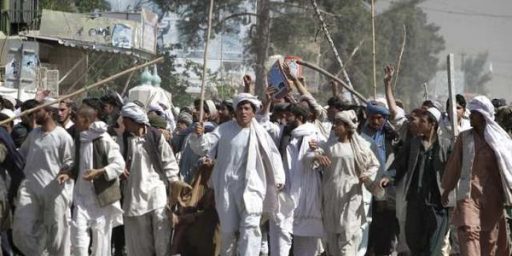
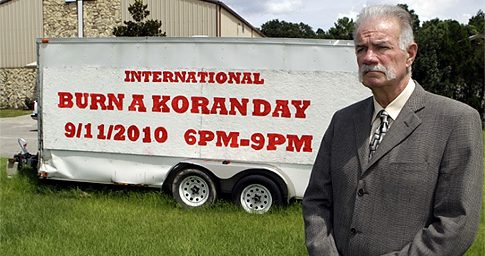
“the idea that someone can be jailed for speaking out against a war they disagree with would outrage most Americans today”
That’s a nice thought, but I remember an awful lot of Righties who thought people protesting the Iraq war should be arrested — or hanged as traitors.
I would submit that such people represent a minority of Americans
Well, it seems Justice Breyer is intimating that if somewhere out there where internet reaches were to react to such speech in a violent and riotous manner, then it might not be constitutionally protected. This is just the logical conclusion to continuing drive to rule of the crazies: If it’ll make them mad and they have a violent nature, then you can’t say it.
So it is quite simple, if someone says something a group doesn’t like, start a riot, burn some cars, kill some people. Then the law will keep them from saying it.
Somebody over at Volokh offered this hypothetical: Suppose some guy runs into a mosque and, in full view of the folks assembled, torches a Koran, all the while screaming anti-Muslim slogans. Would that be constitutionally protected?
The devilish thing here, if I can put it this way, lies in what exactly we take the word ‘that’ to refer to in the hypothetical. If Smith the perp offers as a defense that his action and speech are constitutionally protected, I think most of us would say, “Eh, I don’t think so.” And we’d say this even if we’re not aware of the case law. In this instance, it’s not his action or speech per se that is at issue, but the circumstances in which he performed the act and uttered the speech. Brandenburg controls. It’s a question of proximity and imminence. And this disposes of JKB’s worry about the internet and crazies, I think. If Pastor Jones burns a Koran, and some folks in Kashmir, or Bayonne, for that matter, go ballistic, the conditions of being proximate and being imminent do not obtain, even in our internet-connected world.
I suspect that situations like this are what Justice Breyer was getting at when he said, “It will be answered over time in a series of cases which force people to think carefully. That’s the virtue of cases.”
Justice Breyer’s uncertainty is both disquieting and disgusting. My Constitutionally guaranteed civil right becomes a prisoner of the insanity of someone who lives in another country. What a pathetic statement by a supposedly trained legal mind.
Sam
You are obfuscating the issue when there is no issue. The speech described in your scenario is protected under the First Amendment. Period.
Once you start going down the road of determining the Right of Free Speech by basing it upon a hearer’s reaction to the words, you are placing that right in a capricious and arbitrary “means testing” process. The idea of placing our freedoms at ransom to the whims of Islamic nutjobs is cowardly and despicable.
Breyer seems to be saying that Koran burning would amount to “fighting words,” which were ruled as not protected way back in Chaplinsky v. New Hampshire (1942). But this makes sense only in the consideration of time, place, and manner (as implied by the earlier comment about doing it inside a mosque). Texas vs. Johnson would seem to make clear that mere expression of contempt is protected.
Fighting words is another possible avenue of attack, of course, but even there I think any attempt to outlaw Koran burning runs into problems. Chaplinsky and the cases that followed all assumed that there was some reasonableness required in the reaction to the supposed “fighting words” and that mere offensiveness does not constitute “fighting words”
It’s also worth noting that this is all largely an academic argument. There is no current law against Koran burning, and no generally applicable law that it could be applied to. So, until someone proposes a law to outlaw burning of the Koran we’ve not got much to worry about
The speech described in your scenario is protected under the First Amendment. Period.
Uh, no.
BTW, I’m not advocating outlawing Koran, or Bible, of flag burning.
I agree with Sam, the hypothetical if severe enough would not be protected speech and the koran burner could be arrested for disturbing the peace. I think it would have to be more than simply burning of the koran.
I also don’t think it could be extended to keeping the peace abroad. I don’t think the government has a legitimate interest in maintaining the peace in foreign countries, even countries in which we are at war. If it did, I think the writ of habeas corpus would need to be suspended to allow the military to arrest people whose conduct would hurt the war effort. I would hope Congress would think better if doing that.
I remember an awful lot of Righties who thought people protesting the Iraq war should be arrested — or hanged as traitors.
lol, just call us nativists and tribalists and stop emotionally jumbling up the facts!!!!
It makes you sound smarter to other driberals………..
@ Sam
Uh, no.
Oh, then I guess the multitude of occasions in the past, where the behavior you described has occurred in insulting Jews and Christians, was truly against the law and the authorities simply declined to arrest anyone?
The problem with the “unprotected” line of argument is that this country has a long history of allowing this type of behavior against the two world-wide religions which are disdained by the left; Judaism and Christianity. A bit late in the day to start claiming that the level of insult perceived by the target of the abuse is the determining factor in whether or not the speech is protected.
BTW, I’m not advocating outlawing Koran, or Bible, of flag burning.
Neither am I.
Juneau, kid, what the hell are you on about?
A bit late in the day to start claiming that the level of insult perceived by the target of the abuse is the determining factor in whether or not the speech is protected.
Did you just blow past the discussion of Brandenburg v. Ohio and Chaplinsky v. New Hampshire?
@ sam
Did you just blow past the discussion of Brandenburg v. Ohio and Chaplinsky v. New Hampshire?
No, Sam, I didn’t. But let me ask you a question. Are we all just flapping our gums here on OTB about hypotheticals, talking just for the sake of expressing our opinions? Or are we weighing ideas for actual merit?
Is Breyer some flunky who’s musings we can ignore? Obviously not. Breyer’s notion is a radical idea which would put the extent of my freedom in the hands of how pissed off I make someone by doing something which presents no credible threat of harm to them.
Sometimes I get the impression that if you were to be faced with our Government discussing the pros and cons of simply confiscating our property to better manage it, y’all would love to spend hours breaking it down into the finer points and talking about it. When the notion should rightly be rejected out of hand…
Perhaps this site is not for weighing ideas, but simply to comment on the topic.
I’m at a loss to understand your train of thought. Hypotheticals are a well-established way of examining the extent of constitutional provisions. As such, they fully qualify as “thought”. As for your jibes at Breyer, I really do fail to see what you’re on about. He was asked a question, roughly, “Is the right to burn a Koran [or a bible] an absolute right.” It seems to me that he answered the question just like any Supreme Court justice would in the absence of any pending case. As Doug put it:
And as some of us went on to point out, there’s case law that says, in effect, It depends. Whatever is your problem with all this? Under Brandenburg, the pastor’s burning of the Koran is protected; under Chaplinsky, the guy in mosque is not protected (I’d argue). This is the state of the law.
Finally, where in this
Do you find grounds to say this:
This is also how Breyer talked in the interview about the issue of cameras in the courtroom. To paraphrase: We haven’t voted on it yet. I haven’t made up my mind yet. I believe there will be arguments on both sides. One side is this; the other is that. We’ll work out our decision by hearing both sides.
I find Justice Breyer’s remarks puzzling on a number of grounds. They may just demonstrate that being a Supreme Court justice is very freeing.
It seems to me that the assertion would fail either under “fighting words” or “yelling ‘Fire!’ in a crowded theater” arguments. In the first instance the Court has repeatedly held that patently offensive speech may well be protected. I’m thinking of Street v. New York and Cohen v. California. More recent decisions by the Court suggest that any statute that could actually prohibit burning of the Qur’an would be deemed overly broad. It also bears mentioning that to the best of my knowledge the Court has left what actually constitutes “fighting words” vaue.
In the latter case wouldn’t burning a Qur’an need to present an actual, imminent danger (presumably due to the response it would provoke)?
Additionally, I wonder if upholding such a statute wouldn’t be very damaging to civil liberties. If burning a Qur’an is deemed “fighting word” and, say, immersing a crucifix in urine isn’t doesn’t that make Islam a special case and, specifically, a special challenge to public order? Wouldn’t that open the door to restrictions on Islam or an outright ban? If burning a Qur’an is deemed to present an imminent danger, isn’t that an assertion that Muslims are dangerous?
Sam, you seem over time to be unable to grasp any though which deliniates Amreican rights. Seems you are always on the side of those who would infringe on them. Why is that? I wonder if you ever thought about if they make freedom of expression as in burning a holy book illegal as not protected as freedom of speech, how long do you think it would be before they decided to disagree with our leaders would fall into the same catagory? You always accused conservatives of intending to do that during the Bush years yet it is the left who wants to limit freedom in most areas. I notice the 1st Amendment does not place limits on freedom of speech only the courts have done that. It could have been done an easier way by making the speaker responsible for what happens as a result of that speech but that is another subject. If you need a for instance. If you yell fire in a theater and someone is hurt as a result. You right to yell fire is protected but you are held responsible if people are injured. By the way. Are you allowed to yell fire if there is one or are you supposed to let people die in the fire without warning them of same?
@Dave
“It also bears mentioning that to the best of my knowledge the Court has left what actually constitutes “fighting words” vague.”
Well, Chaplinsky said this about fighting words:
Not the least vague formulation, I’ll grant, but the idea, or part of the idea, tending to incite an immediate breach of the peace, is clear enough, I think. But, once again, this would depend on circumstances, audience, and so forth. Hence my hypothetical concerning the guy in the mosque.
For “fighting words” it might be useful to substitute drunk and disorderly; a guy who is clearly saying things to pick a fight. I think sam’s hypo at 14:14 could be a case where it could be “fighting words.” The guy went to a place where he intended to provoke a confrontation; he’s not spouting nonsense into a camera or behind sheets in the woods. The listeners are likely to be shocked and not feel the normal ability to withdraw to avoid the confrontation.
The problem is that the guy’s conduct is probably criminal for other reasons, like criminal trespass or attempted arson.
I am somewhat confused by Doug’s update to the title. He seems to read the Justice’s statements as referring to some new law, like an anti-flag-burning law. I guess I (and sam) have been assuming he’s also talking about burning the koran as conduct that may be criminal under existing laws under specific circumstances.
Ok, got stuck in traffic on way home and actually listened to the interview. He avoided directly commenting on the Koran case as it has the potential to come before him. He was talking about the concept of freedom of speech. He noted that flag burning is legal. He noted that you cannot yell fire in a crowded theater. He laid those out as examples of the kind of thinking that could be used in deciding cases involving freedom of speech. It was a decidedly bland, careful statement.
Steve
Hi i would like to suggest the Law offices that handle misdemeanor, felony, DUI, and juvenile cases throughout the Bay Area including: San Mateo, Santa Clara, and San Francisco counties. We handle all types of criminal cases including.